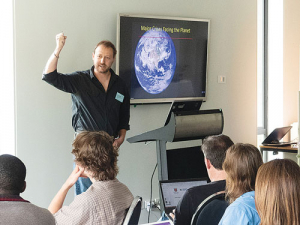NZ kiwifruit sector on alert for mysterious Italian disease
New Zealand's kiwifruit industry is on alert following reports of a mystery disease that is sweeping through Italian orchards.
 American entomologist Dr Jon Lundgren speaks at a workshop on biological pest control, organised by the Bio-Protection Research Centre, Lincoln University.
American entomologist Dr Jon Lundgren speaks at a workshop on biological pest control, organised by the Bio-Protection Research Centre, Lincoln University.
Agrichemicals are an addiction and pests are not the problem, claims a visiting American entomologist, Dr Jon Lundgren.
Lundgren promotes “regenerative agriculture” – a term he says is now replacing “sustainable” agriculture.
The FAO estimates that the world has only 60 years of topsoil left, he said.
“So we can’t just be sustaining a degraded resource. We need to be regenerating that, while producing our food.”
That requires re-growing soil and biodiversity on farms.
“I think farmers are realising more and more that their profits are decreasing. It’s getting harder and harder to farm the way we’ve been.
“We are just degrading that natural resource base and the writing is on the wall about how long we can do that.”
Lundgren was speaking at a four-day workshop on biological pest control run by the Lincoln University Bio-Protection Research Centre.
He told the workshop that pests are a symptom of underlying imbalance, and monoculture agriculture is the central problem.
“The way we approach food production is way, way too simplified.”
Lundgren runs a research centre on a small farm in South Dakota, surrounded by large monoculture cropping farms and continuously grazed beef farms.
“This is kind-of ‘ground zero’ for where change really needs to happen.”
Biodiversity was how habitats used to function and when you eliminate the diversity from a system the only thing left is to dose with agrichemicals, yet the ranchers with the most pests are the ones using the most pesticide use, he said.
One researcher showed that avermectins, commonly used in drenches, passed through the animal and then killed 98% of the insects living in dung, when only 1.7% of those were actually pests.
The first step to regenerative agriculture is to abandon the pesticides, said Lundgren.
“Usually within the first year you see that these natural balances of communities start to re-establish.”
Regenerative ranchers who replace pesticide use with good management find it a good business decision, he said.
The second step, for graziers, is to mimic natural grazing patterns by high-intensity grazing in small areas, frequently moving the stock and leaving the heavily grazed pasture to regrow for as much as a year before it is grazed again.
“We can learn a lot from the way they used to produce food, back before industrialisation.
“Technology has shown us what some of the yield potentials and profit potentials are, but I think we’ve reached a plateau in how far we can push things.”
The 5+ A Day Charitable Trust has launched a collection of affordable recipes designed to turn everyday vegetables into seasonal stars.
Jane Mellsopp has been confirmed as the new Government Appointee to the New Zealand Meat Board (NZMB).
To celebrate the tenth anniversary of its annual Good Deeds competition, Rabobank will give away $100,000 to improve rural community hubs, schools, clubrooms, and marae across New Zealand.
Agricultural and veterinary product supplier Shoof International has appointed Michaela Dumper as its new chief executive.
Federated Farmers is celebrating following the Government's announcement that young farmers will be able to use their KiwiSaver funds to buy their first home or farm.
The Meat Industry Association of New Zealand (MIA) today announced that Chief Executive Officer Sirma Karapeeva has resigned from the role.